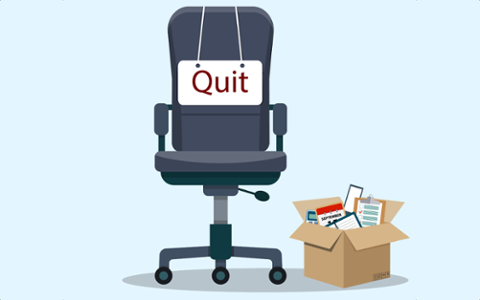Given the economic blow leveled by COVID-19, and the fact that the number of new hires who ended up regretting their job decision has risen nearly 50 percent since the last recession in 2008, it is probably a good idea to leave the door open if you decide to change jobs, just in case you want to return.
“A lot of people focus on making a great impression when they start a new job, but how you end a job matters just as much,” noted Ravi Raman, executive coach and former director at Microsoft.
Because you never know when you might cross paths with former colleagues or supervisors, or need a recommendation to advance your career, here are some ways how to quit a job without damaging key relationships or ending up on a “no re-hire” list.
Don’t Rage Quit
People who quit a job in the heat of the moment often say things they later regret, noted Nicole Wood, CEO and co-founder of Ama La Vida coaching. If you feel your emotions are getting out of control, take some time to calm down before you resign.
Then, quash the rumor mill by informing your manager first about your decision. During your meeting, ask them how they’d like to handle the announcement, and then follow their lead.
Take the High Road
It can be tempting to complain about your boss or vent to your co-workers about the workflow or product, especially when your closest friends and colleagues are bound to ask why you are leaving, Raman noted.
However, try to keep your emotions and opinions in check once you’ve submitted your resignation, because there’s no such thing as an off-the-record conversation in the workplace. Remember, the decision to rehire a former employee is largely discretionary. Most companies won’t hire you back if you badmouth your manager or fail to provide constructive and tactful criticism or suggestions during your exit interview. That can have bad long-term impacts on your career.
It’s Not You, It’s Me
Don’t leave a trail of broken relationships and hard feelings by encouraging others to be unhappy or follow you to your new company. Instead, take responsibility for your work and choices by focusing on the positive reasons why you’re leaving, such as the chance to be a team lead or work with cutting-edge technology.
Don't Leave Your Team in the Lurch
Regardless of your reasons for quitting, your departure could leave your team short-handed or put them behind schedule. Help to lessen the burden by staying engaged until the end and doing what you can to ensure a positive and orderly transition. After all, your legacy will be defined by your personal choices and what you leave behind. Moreover, your reputation will follow you wherever you go.
For instance, consider presenting a draft of a transition plan and even suggesting a possible replacement during your resignation meeting with your boss. Make things easier for your teammates by documenting your work and current processes or the reasons why a set of features was prioritized, Raman suggested. Let your teammates know that they can reach out if they can’t understand your code or run into a bug they can’t fix after you leave.
“Giving two weeks’ notice may be fine for junior-level employees, but if you’re a senior engineer or your team is in the middle of a critical deployment, you should offer to stay four to six weeks,” Wood added.
Also, offer to play an active role in training your replacement to give your team time to adjust.
Express Gratitude
While no one enjoys having an ineffective boss or dysfunctional team, everyone can find valuable lessons from all their workplace experiences—the good and the bad. You’ve already sent a message by resigning, so try to remain as positive as possible in your final communications (both verbal and written).
Send a farewell message to co-workers thanking them for their support and connect with them on professional networking sites. Offer to buy them a drink or treat them to bagels or donuts on your last day. Thank your boss in front of your peers and offer to buy her lunch. While you want to make it clear that your decision is final, let your boss know that you definitely want to keep in touch and that you’d like to keep the door open for future opportunities, conference get-togethers etc.
Remember, even if you're happily employed today, you never know what may happen tomorrow. How you behave during your final days on a job is how you will be remembered.



